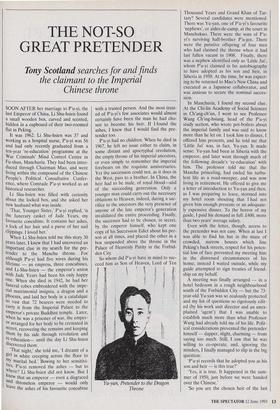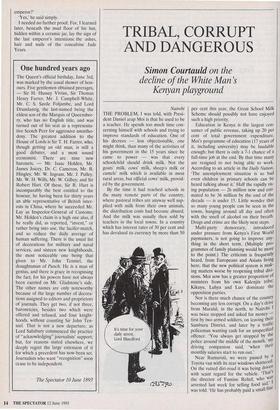THE NOT-SO GREAT PRETENDER
Tony Scotland searches for and finds
the claimant to the Imperial Chinese throne
SOON AFTER her marriage to P'u-yi, the last Emperor of China, Li Shu-hsien found a small wooden box, carved and scented, hidden in a cupboard of their two-roomed flat in Peking.
It was 1962: Li Shu-hsien was 37 and working as a hospital nurse, P'u-yi was 56 and had only recently graduated from a ten-year 're-education' programme at the War Criminals' Mind Control Centre in Fu-shun, Manchuria. They had been intro- duced through Chairman Mao, and were living within the compound of the Chinese People's Political Consultative Confer- ence, where Comrade P'u-yi worked as an historical researcher.
Li Shu-hsien was filled with curiosity about the locked box, and she asked her new husband what was inside.
`That, Younger Sister,' P'u-yi replied, 'is the funerary casket of Jade Years, my favourite concubine. It contains her ashes, a lock of her hair and a purse of her nail clippings. I loved her.'
When Li Shu-hsien told me this story 30 Years later, I knew that I had uncovered an Important clue in my search for the pre- tender to the Manchu throne. For although P'u-yi had five wives during his lifetime — an empress, three concubines, and Li-Shu-hsien — the emperor's union with Jade Years had been his only happy (Me. When she died in 1942, he had her funeral robes embroidered with the impe- rial matrimonial insignia, a dragon and a Phoenix, and laid her body in a catafalque se vast that 72 bearers were needed to carry it from the Imperial Palace to the emperor's private Buddhist temple. Later, When he was a prisoner of war, the emper- or arranged for her body to be cremated in secret, recovering the remains and keeping them by his side through revolution and re-education— until the day Li Shu-hsien discovered them.
That night,' she told me, 'I dreamt of a girl in white creeping across the floor to mY marital bed.' Bowing to her sensitivi- ties, P'u-yi removed the ashes — but to where? Li Shu-hsien did not know. But I Knew that an emperor — even a disgraced and throneless emperor — would only leave the ashes of his favourite concubine
with a trusted person. And the most trust- ed of P'u-yi's few associates would almost certainly have been the man he had cho- sen to become his heir. If I found the ashes, I knew that I would find the pre- tender too.
P'u-yi had no children. When he died in 1967, he left no issue either to claim, in some distant and apocryphal revolution, the empty throne of his imperial ancestors, or even simply to remember the imperial forebears on the requisite anniversaries. Yet the succession could not, as it does in the West, pass to a brother. In China, the heir had to be male, of royal blood—and of the succeeding generation. Only a younger man could carry out the necessary oblations to Heaven; indeed, during a sac- rifice to the ancestors the very presence of anyone of the late emperor's generation invalidated the entire proceeding. Finally, the successor had to be chosen, in secret, by the emperor himself, who kept one copy of his Succession Edict about his per- son at all times, and placed the other in a box suspended above the throne in the Palace of Heavenly Purity in the Forbid- den City.
So whom did P'u-yi have in mind to suc- ceed him as Son of Heaven, Lord of Ten
Yu-yan, Pretender to the Dragon Throne
Thousand Years and Grand Khan of Tar- tary? Several candidates were mentioned. There was Yu-yan, one of P'u-yi's favourite `nephews', or aides-de-camp, at the court in Manchukuo. There were the sons of P'u- yi's surviving half-brother P'u-jen. There were the putative offspring of four men who had claimed the throne when it had last fallen vacant in 1908. Finally, there was a nephew identified only as 'Little Jui', whom P'u-yi claimed in his autobiography to have adopted as his son and heir, in Siberia in 1950. At the time, he was expect- ing to be returned to Mao's New China and executed as a Japanese collaborator, and was anxious to secure the nominal succes- sion.
In Manchuria, I found my second clue. At the Chi-lin Academy of Social Sciences in Ch'ang-ch'un, I went to see Professor Wang Ch'ing-hsiang, head of the P'u-yi study section, who wrote pot-boilers about the imperial family and was said to know more than he let on. I took him to dinner, I offered him presents, and he told me that `Little Jui' was, in fact, Yu-yan. It made sense: Yu-yan had been in Siberia with the emperor, and later went through much of the following decade's 're-education' with him. The professor told me that the Manchu princeling, had ended his turbu- lent life as a road-sweeper, and was now living in retirement. He offered to give me a letter of introduction to Yu-yan and then, as 1 was preparing to leave, stormed into my hotel room shouting that I had not given him enough presents or an adequate- ly expensive dinner. To the horror of my guide, I paid his demand in full: £400, more than two years' average salary.
Even with the letter, though, access to the pretender was not easy. When at last I was able to find his but in the maze of crowded, narrow houses which line Peking's back streets, respect for his poten- tial loss of face prevented my meeting him in the distressed circumstances of his home; instead I waited outside, while my guide attempted to sign treaties of friend- ship on my behalf.
A meeting was finally arranged — in a hotel bedroom in a rough neighbourhood south of the Forbidden City — but the 73- year-old Yu-yan was so zealously protected and my list of questions so rigorously edit- ed (by his work unit director and an unex- plained 'agent') that I was unable to establish much more than what Professor Wang had already told me of his life. Polit- ical considerations prevented the pretender himself — dapper, slight, charming — from saying too much. Still, I saw that he was willing to co-operate, and, ignoring the minders, I finally managed to slip in the big question: `F'u-yi records that he adopted you as his son and heir — is this true?'
`Yes, it is true. It happened in the sum- mer of 1950, just before we were handed over the Chinese.'
`So you are the chosen heir of the last emperor?'
`Yes,' he said simply.
I needed no further proof. For, I learned later, beneath the mud floor of his hut, hidden within a ceramic jar, lay the sign of the last emperor's intentions: the ashes, hair and nails of the concubine Jade Years.



































































 Previous page
Previous page